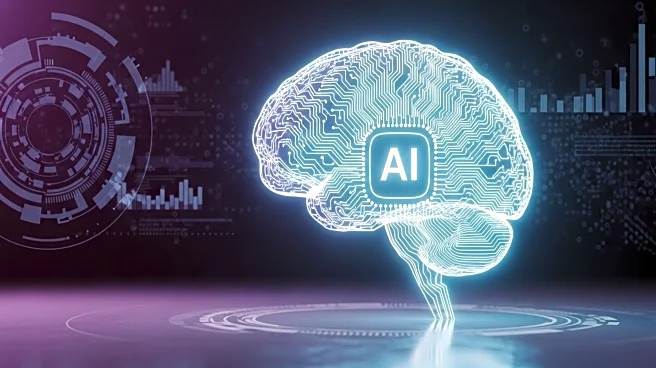What's Happening?
In 2025, artificial intelligence (AI) has become a significant driver in the venture capital (VC) industry, with 40% of exit value stemming from AI-related deals, according to PitchBook. This trend marks a record year for AI, accounting for 64.3% of deal value in the U.S. by the third quarter. The integration of AI across various sectors is reshaping the VC landscape, with AI being seen as foundational to venture capital strategies. Kyle Stanford, PitchBook's director of U.S. venture research, notes that AI is being integrated into every part of the economy, providing new ways for companies to solve challenges and drive hyper scaling. Despite the dominance of AI, the IPO and M&A environment remains uncertain, with concerns about the strength of the IPO market due to a relatively small pipeline.
Why It's Important?
The reliance on AI in venture capital is reshaping the U.S. economy, potentially adding between $2 trillion and $4 trillion to domestic GDP over the next decade, according to Brent Hill of Origin Ventures. This shift represents a new economic era, following agrarian, industrial, information, and digital phases. The widespread adoption of AI is driving productivity and innovation, but it also raises questions about the sustainability of such reliance. The parallels to past tech bubbles, such as the dotcom era, suggest caution, yet the maturity of the current VC industry and the unprecedented nature of AI adoption may mitigate some risks. The focus on AI could lead to significant gains for companies that successfully integrate these technologies, while those unable to adapt may face challenges.
What's Next?
The future of venture capital may see continued reliance on AI, with strong companies potentially listing next year after extended periods of staying private. The debate around whether the current AI-driven VC environment constitutes a bubble remains open, with some experts suggesting that the high valuations of AI companies could lead to market corrections. However, the technological shift driven by AI is expected to continue, with companies and investors eager to capitalize on its potential. The ongoing integration of AI into various sectors may lead to further innovation and economic growth, but stakeholders must remain vigilant about the risks associated with rapid technological adoption.
Beyond the Headlines
The ethical implications of AI's dominance in venture capital are significant, as the technology's integration into every part of the economy raises concerns about data privacy, job displacement, and the concentration of power among tech giants. The cultural shift towards AI-driven solutions may also impact societal norms and values, as automation and machine learning become more prevalent. Long-term, the reliance on AI could lead to shifts in labor markets, with increased demand for AI-related skills and potential challenges for workers in traditional industries.









